#i think it's her proper interaction with Hera so that's important
Explore tagged Tumblr posts
Text
happy birthday to Amie!!! i don't have any snippet with her to post bc i haven't technically written her yet but i hope to write a Significant scene with her later
#the secret sun#it's the midnight fairy tale esque ball scene btw#i think it's her proper interaction with Hera so that's important
0 notes
Note
Hello! How are you doing?
This is an ask for you to say all the strong feelings and thoughts you have about the gods of the riordanverse, wether it's in general or certain gods in particular, if you'd like to
Hey^^. I'm fine, thanks for asking!
Thank you for the ask too! Sorry for being a bit late.
(Sorry for any mistakes! English is not my first language and I'm a bit sleep deprived! )
So first of all I wanna say that I think that everything Luke said about the PJO gods was absolutely right! So were his ideas. They were just exected wrong.
Secondly, all of the gods in the riordanverse are awful. Their depiction goes from questionable at best to borderline disrespectful to the religion and all of their followers. Riordan's attitude doesn't help.
As for specific gods.
One of my biggest problem is with Artemis. First of all why show her like a 12 year old? Even if she was aro/ace (even though she is wildly known as wlw goddess) why not show her as a 20 something years old who is very very badass and very very aro/ace.
Also, I have a problem with the way she interacts with the girls she recruited. For example Bianca. The whole recruitment seemed awfully manipulating. Bianca was scared and just introduced to the Mythycal world, she didn't know her options or anyone really. Why ask her then? Or even if she asked why accept? The poor girl obviously was very confused. Let her actually think about it. At least to me that whole scene seemed very off especially with the fact that Artemis is a goddess famous for protecting woman.
The hunt switching sexualities is so shitty. It actually makes me vomit. And why are they shown like little girls? Like spoiler alert but u can be in fact ace and an adult
Both Zeus and Hera are awful depiction of the actual Gods and I hate that with my whole heart. Their characters and the way they interact with children, especially Zeus' children is just no. Like they punished Thalia for bullshit after she blindly believed them all her life and with one of the most cruel things too. Neither of them helped Jason even though he is connected to both of them. Like fuck but they totally deserve to be overthrown in the Riordanverse.
I wish we had seen Mr.D not like this old drunk. Like yeah he probably was sad bc of his punishment, but 100+ years in that form and moping around seems much. Wish we could have seen him being this really young athletic guy who loved having fun with the older kids and probably scared the shit out of the younger ones. Like this big brother who everyone is annoyed by, but he lets them have parties and snuck a joint or two and some alcohol so it's all fine. He also can get very scary, very fast though, like he'd probably can turn someone who is pushing his limit into a dolphin in few minutes. If they were important Chiron would make him turn the person back, so he doesn't get punished more. He also would make sure that the kids have proper therapy or at least some sort of one that isn't smack a dummy with your sword. He may have some followers in Camp.
I hate Aphrodite so much. She seemed so off the entire first series and in HOO where she basically glamorized the American Civil War in front of two WOC is just so wrong on so many levels. Like wtf was R*ck thinking while writing this? Actually what the heck was he thinking during the whole the American Civil War was just a war between Romans and Greeks?
Hermes is just... Hermes. He visited Percy multiple times, but couldn't come in Camp or on the streets to help/guide Luke and tell him he is proud for like 2 minutes? Travis and Connor have 2 years difference which means that he visited their mom twice and probably took care of Travis as a toddler bc of that, but he couldn't come to May's house to see if his son is okay and has at the very least something proper to eat. Not to mention that he has multiple kids, excluding Travis and Connor, which are younger than Luke which means that while his 'favorite' kid was almost dying, he was hooking up with someone. He, also came to Luke to basically say he shouldn't have come to his own home and lowkey tell him he is disappointed, as if the kid had any other choice while Thalia was hurt. And the way he refused to take accountability for the fact that his past actions had consequences and just blamed Annabeth? Ugh... can he stop being such stereotypical asshole? I really wish we had seen Thalia just screaming at his face for that.
For anyone disagreeing on this matter, I don't take critism. I can absolutely talk and discuss the other gods and can admit I'm wrong, but not him.
I don't like Poseidon. This is just an opinion and a bit of a self projecting. Nothing else really.
I can't think of anything else right now. So this is it! Thank you for reading my rant ig
#pjo#percy jackson#percy jackson and the Olympians#pjo luke castellan#luke castellan#pjo luke#pjo thalia grace#pjo thalia#jason grace#hermes pjo#thalia pjo#pjo aphrodite#pjo hera#pjo zeus#pjo dionysus#pjo poseidon#pjo artemis
42 notes
·
View notes
Text
Queenslayer
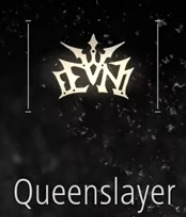
Queenslayer Blood Code Study- Main Character
"Your own blood code, which was thought to be lost in the fight with the Queen long ago. The old feelings inside still speak to you. This time you must ensure a lasting peace. This code is well balanced for exploration and melee combat, and features high HP and endurance."
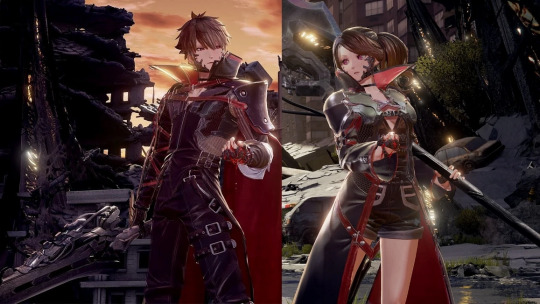
Introduction to Blood Codes and Main Character
Blood Codes are the abilities imbued within a Revenant's Blood. Each Blood Code is unique to each Revenant that resides within the Gaol of the Mist. Once a Revenant has awakened from their slumber after the BOR parasite has been placed in them, the blood takes on a Code which I believe derives from the characteristics of that Revenant.
As the Player Character, MC starts in the realm of Vein as a First/Second Generation Revenant who was enlisted in Operation Queenslayer. The story behind the main character is largely unknown besides a few details here and there, and their backstory is up to the Player's interpretation. What we do know, is that the main character is a chivalrous self-sacrificing individual who is willing to help find The Source and is determined to save the Successors while learning more about what they're meant to do.
Prologue of Queenslayer Blood Code
While the Blood Code itself doesn't reference from any mythology from different cultures, there are hints that it does link to Greek lore from my understanding of this blood code.
Back when I was still on anon and I was following Code Vein content on tumblr (cause I forgot my old password and logins), a bunch of theories started popping up in @louis-with-an-s ‘ blog (tagging for credit and source for comments below!). As inspired by lore hunters on youtube, I was already analyzing Louis’ and Yakumo blood code at that point and I was midway of researching for Louis’ Blood code study (since this series is helping me refresh on my Greek Mythology) when this comment came up (anon if you’re out there, let me know so I can credit you too!):
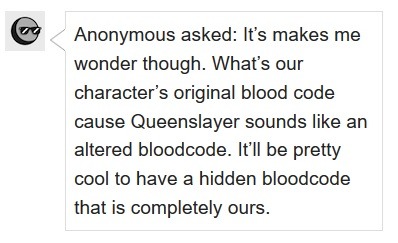
I was also thinking the same thing that it's way too convenient that the MC's Blood Code is named after Operation Queenslayer. Each blood code is uniquely named and it's different for each Revenant which probably made the most of us think that this isn't our initial blood code as presented in the game. It's 100% unlikely that the rest of the Revenants in Operations Queenslayer had this Blood code, but then why is MC's blood code named after Operation Queenslayer?
Then @nosferabbit mentioned these comments below (I hope you don't mind me tagging you! I just want to give you credit! If you're uncomfortable with it, please let me know D: )

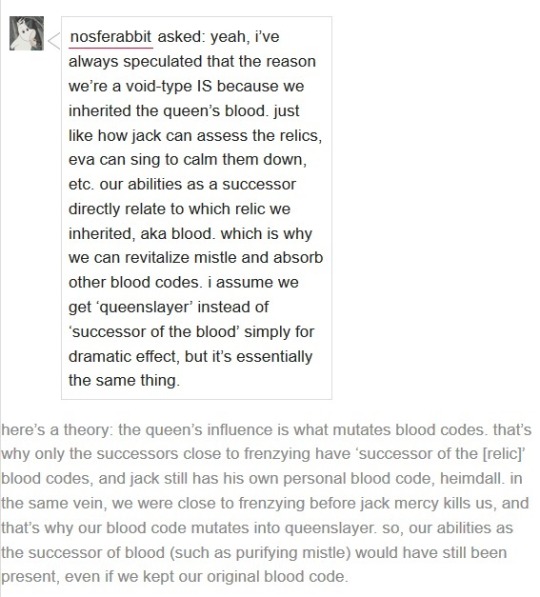
I thought of it even more since I was already linking Yakumo’s and Louis’ Greek God counterparts since their lore is strangely close to Heracles and Heracles had interaction with both of them in a similar way as their mythology. Then I was like: "Oh lol, maybe MC's previous code was Heracles before they ingested the Queen's blood."
Then I started looking into the other blood codes, then bosses, the depths and my mind went into overdrive. I discovered more things about how MC alarmingly relates too much to Heracles and his lore and I was nervously compelled into making the blog in the end.
Beyond this point, its pure theory on my end. It might be debunked based on DLC's, future updates of the game, etc. If that ends up being the case in the future, I'll conduct a proper post for Queenslayer afterward.
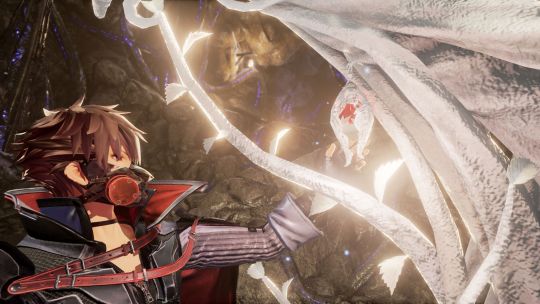
Greek Mythology
From my point of view, MC's initial Blood Code is based on Heracles.
Heracles or Hercules (His Roman name), as most people mostly refer to him (they're still the same god regardless but for this post, we'll refer him with his proper Greek name).
Heracles was cursed by Hera even before his birth. Hera persuaded Zeus that the next child born under the house of Perseus would be the given the position of High King and the child following that would be a servant of Zeus. Hera commanded Eileithyia the Goddess of Childbirth to postpone Heracles being born so instead, Heracles cousin Eurystheus was born first prematurely and Heracles was born after.
Growing up, Heracles had several mentors that taught him various crafts, music, and arts of battle. Later on in his years, Creon the king of Theban gave Heracles his daughter Megara and together they had two children. Hera was jealous of Heracles so she struck him with a madness that caused him to kill Megara and their two kids. Feeling destroyed by the atrocity he caused, he was instructed by an oracle to serve Eurystheus for twelve years and fulfill all the tasks that'll be given to him to purify him of his sin. These tasks, in the end, became the famous tale of Heracles 12 labors.
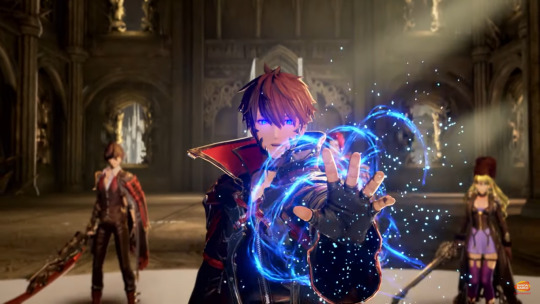
Similarities between MC and Heracles
Both Heracles and MC are the heroes of their own stories. Albeit in different scenarios, Heracles through the twelve labors was granted immortality in the end while the MC is already an immortal vampire who possesses the Relic of the blood.
With Heracles being the inspired Greek God for this Blood code, there is one particular character that should be highlighted before expanding onto the other Gods. The relation to the other Gods will be explained in the next section regarding the 12 labors.
With Io, they're not linked by Blood Code but more of Io's namesake. Io in Greek Mythology was one of Zeus's lovers. She was turned into a cow by Zeus when they tried to prevent Hera from learning of their relationship and Io was made to wander the earth. During her travels, she encounters Prometheus who was still bounded and chained by his punishment. As a clairvoyant God, he predicted that in the future, Io's descendant will be the one to free him and that she'll also turn back into a human. She was eventually turned back into a human by Zeus when they both avoided Hera's gaze and many descendants later, Heracles was born.
Heracles is the descendant of Io (Greek) so Io (game) gives a lot of family/maternal vibes towards the MC and vice versa since MC cares a lot for Io's (game) wellbeing. Io (game) wandered throughout the Vein in search of MC just like her Greek counterpart (but for a different reason). Also, MC ventures into the Ruined City Underground in hopes of freeing Io (game) and in turn MC meets Louis (Prometheus) and frees Louis' worries of his Blood bead research with MC helping his cause. So Io (game) brought MC to Louis (Prometheus) just like how Io (Greek) ended up bearing her future descendant and brought Heracles to Prometheus (Louis' blood code).
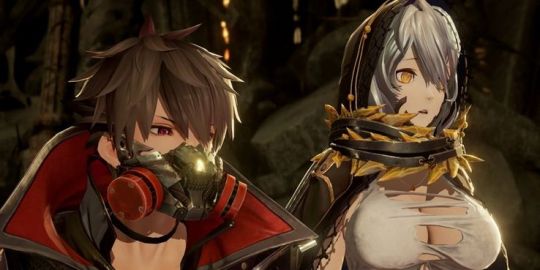
While the MC is a silent Revenant, Heracles is more outspoken, quick-tempered and witty in his actions so personality-wise, they're quite the opposite. From the few chapters of the Code Vein manga, it displays the MC as a quiet individual who speaks up on certain occasions and is thoughtful of the things around them. Heracles started his adventures in life when he was eighteen years old which could be the same age as the MC (however, we don't know their official age and we can make up whatever age for the MC regardless).
"The old feelings inside still speak to you. This time you must ensure a lasting peace." It is likely hinting that the old feelings could either be their true blood code or simply just their memories of themselves before Operation Queenslayer. The lasting peace is part of Heracles where he wants to absolve his sins and be at peace with himself. Or it could be that MC died with regrets?Lasting peace is the MC being at peace with themselves and their own life within the Vein since their life before the Collapse was anything but peaceful.
Now if we observe the symbol for the Queenslayer blood code itself, it appears to be a distorted crown. If we look at it carefully, the crown has letters that spell out "Vein" but out of order. We see the letter "E" first on the left, then the letter "V" in the center with the letter "I" overlapping the V from behind and then the "N" on the right. We also see this symbol beside the area name we're loaded into.
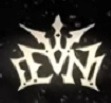

Considering how the other Successors altered blood codes as mentioned from the prologue, each of their blood codes is from the relics the successors possess. The closest reference we can get at this point is with Nicola's altered blood code: Queen's Breath. You'd expect the symbol of it to be a mist of air or something similar to the like, but instead, we see the source of where the breath comes from, which is the lungs. The breath lies within the lungs while blood resides within the veins. With that being said, Queenslayer is possibly the altered blood code the MC gained from the Queen since they are the Successor of the Blood. The symbol is in the shape of a crown probably because of the importance of the Queen's blood during the experiments. It’s a unique visual interpretation of veins since we’re aware how veins in our bodies look like. So just like the Successor of the Queen's Breath is the symbol of the lungs, the Successor of the Blood symbol is the Vein. Neither of these relics can't be displayed physically for what they are and that's why the lungs and the word vein for these altered codes are a representation of these relics.

Continuing onwards, we also have to mention the aftermath of the 12 labors. With all the labors being fulfilled, Heracles joined the Argonauts who were a group of Greek Heroes that combined forces in search of the Golden Fleece. Considering the True End, MC leaves the Vein along with the others, starting their heroic group outside of the Vein. (Of course, they aren't calling themselves the Argonauts but they are similar sort of troupe). While they're not searching for the Golden Fleece since they already have Io's golden blood bead to guide them. Or we could say they’ve always been team Argonauts and they finally retrieved the Golden Fleece aka golden blood bead and achieved greater heights. Knowing Io's lore with Io (Greek) turning into a Cow and the Golden Fleece from the Ram, which is both from the same Bovidae family, the blood bead here is their Golden Fleece.

There's also a part of Heracles lore where he's thrown into madness which could be linked with several things. When MC was killed by Jack in their memories, he killed them since their body was rejecting the Queen's blood and without their mask, they were painfully going through bloodthirst and becoming lost. There's also the bad end where the MC becomes the new Queen and was falling into madness, but Louis killed them before that could happen too. Madness for the MC is falling into Frenzy.
These moments of frenzy could also relate to the death of Heracles as well. With Heracles' second wife Deinanira, she was attacked by the Centaur of Nessus and convinced her to take his blood-covered shirt (which is ridden with poison) and give it to her husband. Claiming it's a love charm and to give it to him whenever he's being unfaithful. She assumed that Heracles was cheating on her so she gave him the shirt, only for him to be tortured by an immense amount of pain. The poison here could also be the cause of the miasma which MC did take in, the Queen's blood which could be considered poisonous to them at first due to their body rejecting the Queen's blood.
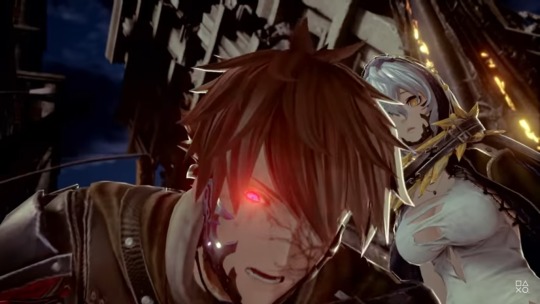
Heracles 12 Labors
With the twelve labors, I initially connected them to the Depths since there are 12 in total. When MC is tasked by Davis to find the Map's to the depths and journey through them, we are given 12 in total for the duration of the game. However, these labors could also associate with other events and Greek Gods which associates with the other characters. Plus a few of the bosses do relate to the monsters Heracles has fought.
1. Slaying the Nemean Lion
The first task King Eurystheus gave to Heracles was to retrieve the skin of the Nemean Lion. The skin from the lion was impenetrable. Since Heracles' arrows didn't affect the lion, he grabbed his club, cornered it in a cave and then choked it to death.
The only thing that comes to mind with this trial is the Argent Wolf Berserker.
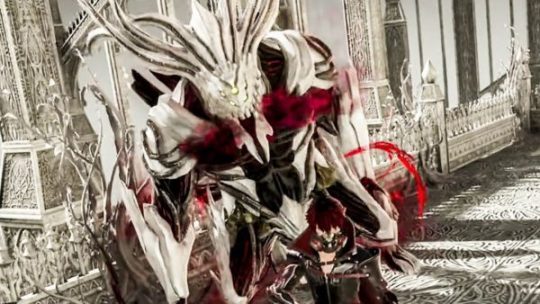
The Argent Wolf Berserker has a strong defense against debuffs (especially poison), but it is weak to blood damage according to the Code Vein Wiki. If I recall correctly, this is the only boss you can perform a parry and back-stab with a draining attack. Just like Heracles easily backed it into a corner and choked it, this boss is susceptible to the same things as well.
Interestingly enough, after Heracles kills the lion he ends up taking the skin from the lion (although some writers/researchers disagree. Heracles' lion skin is worn in most sculptures and paintings but for this instance, let’s roll with the former instead) and after defeating the Berserker, the MC received their first and only memory back. MC is greeted by their vestige after defeating the boss. It's really neat how the first trial holds its significance to Heracles and in turn, the MC regains an important memory of themselves.
2. Slaying the Lernaean Hydra
This labor relates to one area and two of the bosses in the game. The first one I'll be mentioning is the Butterfly of Delirium.
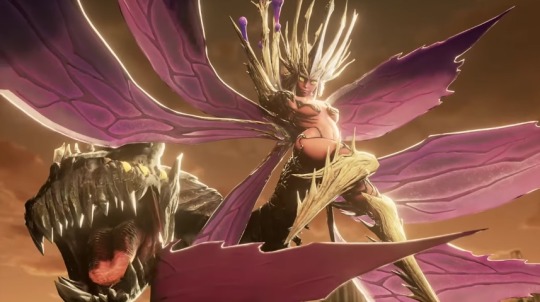
The Hydra in this labor has nine heads and its blood is venomous. As mentioned previously, the poison led to Heracles' death. This boss only has one main body and a tail that acts as a hydra's head since it always spews out poison at the MC. For the Hydra, there are nine heads and one of the heads is the main immortal (since each time Heracles would severe a head, it would regenerate). This is the second boss in the game and the second labor Heracles has to tackle.
Next is the area the Howling Pit and the boss Hatsune Miku Invading Executioner.
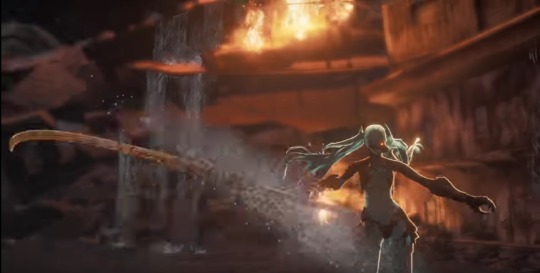
The swamp area pays homage to the area where Heracles slew the Hydra. For the invading Executioner, the only related lore linking with this labor is her Sickle. Some visual sources claim that Heracles used a sickle as part of his weaponry to kill the Hydra.
The depths that has these two bosses are: The Town of Sacrifice, Swirling Flood and Flood of Impurity is part of my count towards the depths connecting to the 12 labors.
3. Capture the Golden Hind
Heracles was then tasked by Eurystheus with capturing the Golden Hind (a deer). This Hind is very sacred to the Goddess Artemis. Knowing these facts, Heracles couldn't kill the Hind. It took an entire year to hunt the deer and when he gave it a minor injury, Artemis appeared in front of him and was furious. Heracles begged for forgiveness and explained why he did what he had to do. Artemis relented and healed the hind with the condition that the hind must be returned to her. Once Heracles returned to Eurystheus, recalling his promise to Artemis, he asks the king to step forward to retrieve the hind himself. Once the king agreed, he stepped forward but the hind ran back to Artemis.
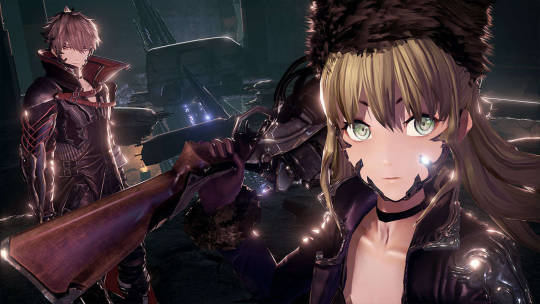
As mentioned in the Artemis Blood Code Study, this heavily related to Mia and her Goddess lore. When MC and gang first meet Mia in the story, she attacks them for their blood beads. The minute Nicola came out to defend her and fainted, she protects him in case they were to hurt him. They gave him a blood bead but he was still killed by Jack.
When Mia and the others learn he's a Successor, they have to end up fighting him when he induced into a frenzy. With the power of the Relic of the Blood, the MC was able to let the two reunite within the memory echo and then revive Nicola afterward, allowing the two to reunite in person. More is expanded in the Artemis Blood Code Study.
With relation to the depths, the Silent White Depths has the Successor of the Breath which still links to the list of the 12 labors/depths with Heracles lore.
4. Capture the Erymanthian Boar
Heracles' next task was to bring the Erymanthian Boar alive to King Eurystheus. The Boar would come down from its mountain every day to attack everything in sight: Animals and people. It was known for its powerful tusks. This one I believe connects with the very first boss: Oliver Collins.
Oliver ends up killing everyone above ground (excluding Io) as he is fully turned into the Lost. When MC and Louis fight him and cut away half of his health, he fully transforms into his lost form. We see he has a tusk and a snout from his mask getting distorted at the transformation.
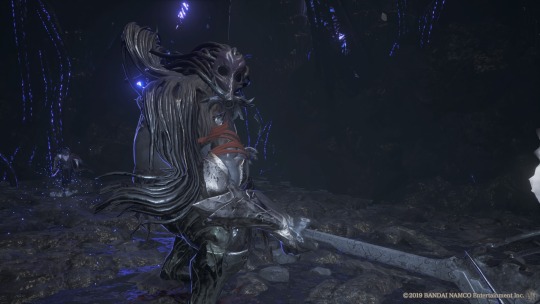
There's also mention of Prometheus during this trial. Heracles decided to visit his centaur friend before the trial to stop, chat and grab a bite to eat since he was famished. The centaur Pholus offered him a meal. When Heracles requested wine however, Pholus was scared to open the jar due to the wine belonging to all of the centaurs. Heracles was just like: "Its fine, I yolo for a living," opened the jar and brought on chaos with all the other centaurs rushing in anger that someone is taking their wine. They attacked him but Heracles retaliated with his poisonous arrows (he used the poison from the Hydra at the 2nd trial) and they ran off. Chiron, a centaur who ends up being a teacher to Achilles received a wound from one of these arrows. The pain was so dreadful that he was willing to take Prometheus' place instead of dealing with the pain. In the end, he gives up his immortality. Pholus wondered how an arrow caused Chiron so much pain. He picked it up curiously but it was accidentally dropped onto his feet. He ended up dying from the intense pain.
Poison is a part of this trial and while Heracles did not use poison against the boar (since he's supposed to bring it back alive), Oliver's boss form is susceptible to the poison debuff. MC traveled with Oliver as a friendly acquaintance in the short time they had together. Oliver like Pholus, was worried about a fellow friend/revenant that they bumped into. In the end, it became their demise. Oliver's mask broke and became Lost and Pholus died from the arrow.
Boss Oliver can be found in the Den of the Dead and Den of Darkness in the Depths.
5. Cleaning the stables of Augeas in one day
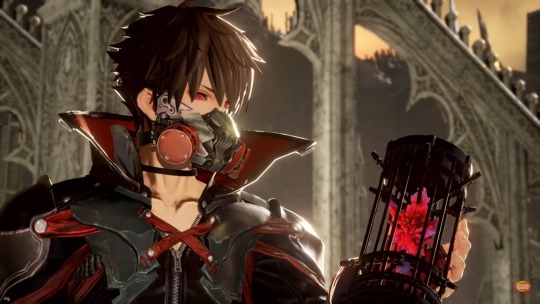
While there isn't an instance where MC is physically cleaning a stable (or cleaning in general). I think this labor relates more to the Trials of Blood. The occurrence happens at specific areas at random and none of the Lost will go away until all of them have been killed. This is one of the labors that has been disregarded in the end so this labor may not have any relevance to the game, however the Trial of Blood is the only thing I can come up with. Since MC does clear away the Lost in several waves like Heracles washes away the stables by re-routing the Alpheus River. MC has to clear out the lost in one go with these trials in the same manner.
6. Slaying the Stymphalian Birds
With no DLC's released as of this writing, I'm currently unable to see or connect with anything relating to this trial. There aren't any aerial creatures that resemble the stymphalian birds in the game or the events relating to the labor itself, so this one is a bit harder to narrow down. If there is anything revealed via DLC's, I'll be editing this instantly.
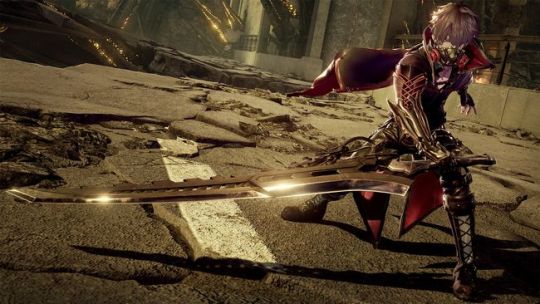
7. Capture the Cretan Bull
At first, I didn't have a clue who or what would relate to this trial but after understanding the nature of the Cretan Bull, I'm willing to put my bets on the Gilded Hunter.
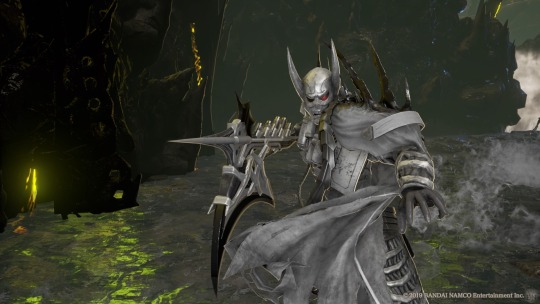
Behind the story of the trial, there was Minos, the King of Crete. Minos promised Poseidon he would sacrifice whatever he sends. Poseidon sends a bull but Minos thought the bull was too beautiful so he sacrificed a different bull instead. Of course, Poseidon was angry about it, so he made the bull he gifted to Minos run rampant over the land of Crete. In the end, Heracles came and wrestled the bull and easily brought it back to Eurystheus.
Since the bull was sent to Mino's by a god, we could say that Mido is the god that let the Gilded Hunter run berserk. There was a point where I guessed that Mido could either relate to Zeus or Ares based on his connection to a few characters and his background, but here I can also consider Poseidon as another candidate for Mido.
The Gilded Hunter can also be found in the Arachnid Grotto in the Depths.
8. Steal the Mares of Diomedes
For this trial, I think there could be a better interpretation of it but from what we have now, I can see the Queen's Knight or the events of Operation Queenslayer itself relating to this labor.
Heracles eighth task was to steal man-eating horses. In some tales, he traveled with a group of companions searching for them. In the case of Operation Queenslayer, Jack's team along with the MC venture out to kill the Lost and track down the Queen.
The Bistones notices that Heracles and his crew were taking away their mares and they went after them (they would be the lost in this case). Heracles needed to free up his group so that he could fight them off so he left the mares with a man called Abderos. Abderos was killed by the time Heracles made it back so he founded a city in his honor.
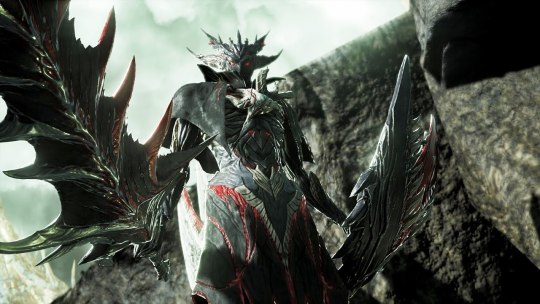
Of course, at a later point, they encounter the Queen's Knight which the Queen's 'puppet' but since this lost has the title of "knight" the lost could be considered to be her steed. A Knight normally would go into battle with their horse to ride into the fields. While this lost isn't a horse, it has connotation of a companion in battle.
Or we can base this trial from the events of it. We can say the man-eating horses are the lost and the Revenants in Operation Queenslayer have no choice but to slay them. The MC takes the place of Abderos instead when they were put to rest and then Jack and Silva went onto founding the Vein (Gaol of the Red Mist). I highly doubt it was named after the MC's blood code but the MC's blood code and the "Vein" are both connected. As mentioned above before the topic of the twelve labors, MC's blood code has the letters of the word Vein while anytime the Player Character is transported to a new area, the same vein symbol like the MC's blood code always appears on the left side of the area's name.
The Queen's Knight can be found in the Zero District within the depths.
9. Stealing the girdle of Hippolyta
I had to think a while about this one since this trial is about Heracles taking the girdle from Queen Hippolyta. A girdle is a belt, and the origin of the girdle was gifted to Hippolyta by Ares since she is the best of all the amazon warriors. Heracles and Hippolyta both befriended each other and Hippolyta was more than happy to give Heracles the girdle but then we have Hera, who didn't want the trial to go smoothly. She told the other amazon warriors (in disguise as an amazon warrior herself) how Heracles was trying to get on her good side only to carry away the queen. So on their boat trip, Heracles noticed the rest of the warriors had their armor and weapons and went and killed the Queen and took the girdle.
Likely this could be associated with the good ending regarding Io. Before we entered the area for the final boss, there are the other Attendants there and we have Io talking with her sisters. Her sisters left their fate in her hands. When Io takes in all the relics and becomes the Weeping Tree, she leaves MC with a golden blood bead. That could also be considered CV's version of the girdle since MC does receive it in the end. Just without the deception part. Io gave the MC something golden and we can say she is the queen of the attendants now from this perspective.
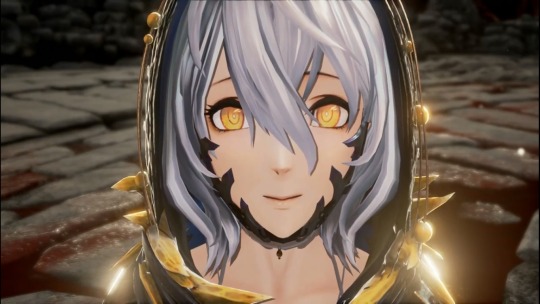
10. Steal the cattle of Geryon
With this labor, I found it connects with the Insatiable Despot.
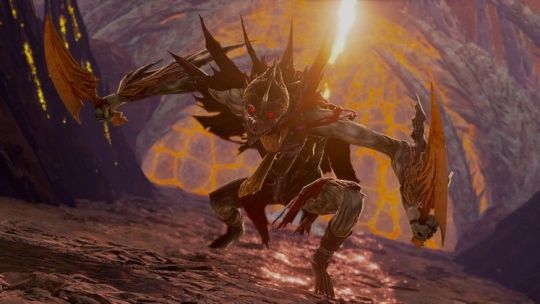
A very unique feature to the insatiable despot is that it has its main weapon (Tyrant's Labyrs) struck through its body. When you cut their HP in half, they proceed to take the weapon out from their body and use it to attack the MC. With Geryon, he has more than one appendage attached to him (three heads and three legs joined at the waist). The insatiable despot has one weapon/appendage through his chest. The boss creates henchmen to attack the player and they could be considered to be the cattle of Geryon. The only exception here is that MC doesn't need to steal anything from this boss. Heracles was tasked with stealing the cattle from Geryon and ended up killing Geryon in the end.
Via the Depths, this boss is found in the Cliffs of Rust.
11. Steal the Hesperidean Apples
Heracles was then tasked to steal apples from Zeus garden but he didn't even know where the garden is. During his journey of finding the garden, he encounters Prometheus who he ends up freeing from his torment by killing the eagle. The clairvoyant god gave him advice as to where the garden is and how he can get the apples. He also gave him advice on his future labors and endeavors. For more details, please refer to the Prometheus Blood Code Study.
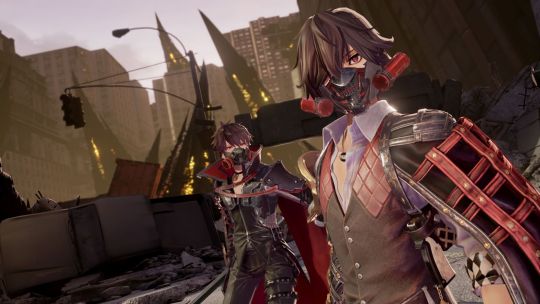
Once Heracles arrived where Atlas was stationed, he quickly mentioned his plight and Atlas agreed to get to the apples from the garden as long as Heracles could hold the skies up temporary. He returned with the apples but had no intention of switching with Heracles. Heracles tricked him that he needed to put on some padding for his shoulders, so when Atlas took the skies again, Heracles just took the apples and ran off.
There was nothing too interesting but after MC accepted Louis' offer, Yakumo tossed him an apple. It's just a regular apple and there was nothing in regards to trickery or thieving, it was just simply an anime version of Atlas giving an anime version of Heracles an apple. Since the apple is what connects both of these gods and Yakumo with MC. More details are already written in the Atlas Blood Code Study.
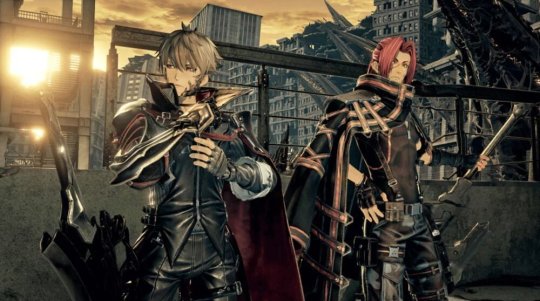
12. Capture Cerberus of the Underworld
The final trial could be interpreted from two different events.
The first one right off the bat is the final boss Skull King and then The Virgin Reborn. They were previously Silva and Silva held the Blood Code of Hades. Hades is the ruler of the underworld and in a sense a protector of the Vein in and out of the Red Mist.
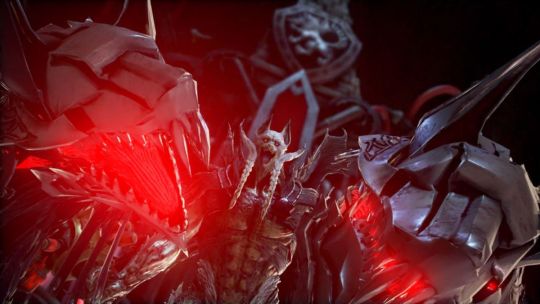
As we see in the boss fight, we have Skull King (aka Silva). During the boss fight, we also see Silva's Hounds-type Blood Veil, operating as the two heads of Cerberus, and Skull King himself being the main third head.
Heracles’ task was to capture Cerberus. After making the preparations to head to the underworld, he arrived there safely and confronted Hades. Hades said he can take Cerberus as long as no weapons are used against them. Heracles succeeded by using brute strength alone.
In Code Vein, it's more of the reverse with this trial, as the MC has no choice but to kill the Skull King aka Silva (who holds the Hades Blood Code).
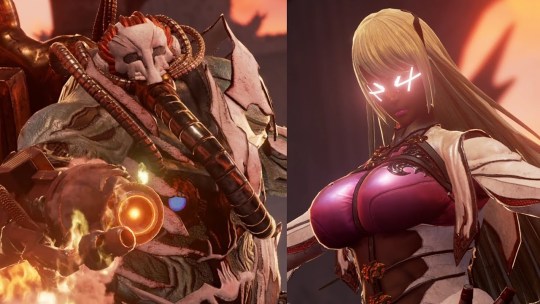
We also have the two artificial Lost that Mido left for us. In the game, we had to fight Blade Bearer and the Cannoneer and quickly afterward we had to fight Mido. These three bosses could also represent the three heads of Cerberus figuratively. Blade Bearer and Cannoneer guarded the way preventing MC and group from progressing further to where Mido is. Just like with Heracles being prevented from entering without preparation. When they do reach Mido, Mido is guarding the path ahead and was also in possession of the relics before sending them Silva's way.
In the lore, the parents of Cerberus were an Enchinda which is a half woman and half serpent, and a Typhon which is a fire breathing giant. The Enchinda relates to the Blade Bearer while the Typhon is the Cannoneer. Based on both of their designs, the relation comes in full circle.
Both of these bosses can be found in the Void District of the Depths.
Queenslayer's Gifts
Drain Boost- Increases all drain ratings while you are focused.
Frenzied Fire- Fires a projectile that decreases the enemies' focus gauge.
Heracles was known for using a bow and arrow. Especially during certain labors after his second labor, where he coated his arrows with the hydra's poisonous blood. Frenzied Fire also matches with how Heracles was easily thrown into madness by Hera. With the focus gauge, once it's been filled, it prevents staggering and using drain attacks to launch an opponent in the air is possible. With the labors that Heracles went through he wouldn't allow any of the creatures, he fought to take advantage of him, so in a sense, he decreases the likelihood of his opponents overpowers him just like the function Frenzied Fire serves. Drain boost just displays the enhanced skills Heracles had while facing opponents. As already mentioned with Frenzied Fire with Heracles countering his opponents, Heracles himself as a trained warrior wouldn't allow himself to be staggered and is intuitive on when to attack.
-
Cleansing Light-For a limited time, a portion of the damage you take will slowly heal automatically.
Instantly this associates with Heracles’ immortality and the labors together. The purpose of Heracles going through these labors was to cleanse his sins of slaughtering his own family in his madness (which wasn't caused by him, Hera was the one that made him go mad). The immortality that Heracles ended up gaining wouldn't kill him no matter what the circumstances. This Gift is ultimately a portion of Heracles' true immortality while it's named after his cleansing ritual with the labors.
-
Circulating Pulse- Unleash a barrage of strikes. An offensive skill performed with One Handed Sword/Halberd/Bayonet.
Heracles throughout his youth studied many forms of combat and mastered several weapons. The fact that this gift is versatile with multiple weapons is a no brainer here. He utilized multiple weapons during his adventures and his twelve labors.
-
Final Journey- Immediately restores all HP and increases abilities but kills you after a short time.
Final Journey is a ticking time bomb. This could be related to a few things I have in mind since this is MC's signature Gift.
First, the name of the Gift itself. Final Journey relates to all of Heracles' journeys and adventures in general since he always lived life at the edge. Any of his adventures could easily be his last and he mustered his strength and prowess to go against all trials, achieve greater things and defeating his opponents. If you've read the labors above or know of them in general then you already know that these tasks are very daunting and no normal being would be able to handle these tasks.
Also similar to cleansing light, this also links with Heracles' immortality. As a god, Heracles used all his abilities in his journey and labors. With his story being so self-explanatory at this point, we know that he's one of the strongest Greek heroes in legend. However, even with that great power, the poison he received was too much to the point that he'd rather die than suffer through the pain. This part is likely the reason why MC/PC dies after using the power-enhancing gift since Heracles was willing to give it up and ascend instead.
Lastly, the image of the gift itself is a skull and most time in real life, it symbolized death or a poisonous substance. This gift grants power but we could also consider it as poison, the poison that ended up killing Heracles in the end.
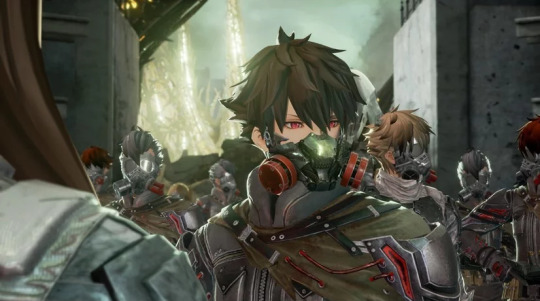
Concluding Thoughts
PHEW, finally this analysis is finished lol. I had way too much fun thinking out this one. Please remember that this analysis is just a theory itself and you don't need to force your OC's to match with my analysis or agree with anything written in this post. What I've gathered in this post is simply based on facts I've noticed based on the amount of Greek Lore that's mixed in the story and with the MC. Regardless if this does turn out to be true or not, I sincerely had fun breaking down the possible lore of the MC. With MC's altruistic nature within the game, it makes a lot of sense of how they would behave. Their past before Operation Queenslayer remains (and will forever remain) a mystery since our job is to fill in those gaps. I like how there's so much Greek lore incorporated into the MC while still giving the player room to add in their own details. Asides from the whole "silent MC until the final scenes in the game" (I wish they could've spoken more D: ) the MC is a great example of how Player Characters should be done.
Also, if anyone wants to discuss more of my Heracles theory, just send an ask! Please let me know what you guys think about it! I hope this post was worth the wait! :D
#code vein#blood code study#queenslayer blood code#code vein theory#blood code queenslayer#code vein spoilers#long post
67 notes
·
View notes
Text
Reza Kasraoui-Müller Five* (8) Identities
*five identities he claims, two he doesn’t acknowledge, and one he is struggling to
Word Count: 1366
Father - In late 2009, an agreement was made between a sorcerer and a fairy, to conceive a child. The fairy and the sorcerer had slept together before, but were always nothing more than ‘allies with benefits.’ But the fairy wanted a child. A child, but not a husband. The sorcerer wanted neither but agreed to supply the other half of the DNA for the child. As the fairy’s pregnancy progressed, however, the sorcerer realized he couldn’t just have a child in this world and not be involved, so the arrangement was modified to be a co-parenting situation between two people that are not, never were, and would never be in love.
On August 27th, 2010, Sabiha Ibitsam Ghadir Basira bint Reza Kasraoui was born in Hammamet, Nabeul Governorate, Tunisia. Reza’s life revolved around her from the moment she took her first breath. Her mother, a fairy named Rafika, had to practically pry her from his arms to nurse her.
Sabiha is Reza’s greatest joy and he cannot imagine ever being separated from her again. To Reza, being a father - Sabiha’s father - is his whole reason for living. Before he is anything else, he is that wonderful little girl’s father.
Sorcerer/Magick - It’s predicted for this to be in the number two spot, but I actually struggled whether or not to place this here. Because frankly Reza feels disconnected from the experiences of most sorcerers around him - currently. I think...Reza himself would more closely identify with ‘magick’, and with pan-magickal struggles and social justice.
Like...Reza probably has more in common as far as lived experiences, with a British werewolf than a British sorcerer. Because British werewolves and Tunisian sorcerers are both heavily discriminated against. Magic is illegal in his home country, he’s been put in jail and denied housing and work for being a sorcerer. British sorcerers, while inconvenienced by restrictions and regulations, simply do not face a comparable level of stigma to sorcerers in Tunisia.
Reza would probably say that prior to living in Austria and now Swynlake, he would have identified more strongly with “sorcerer” as not just a label, but an entire piece of his identity. Tunisian sorcerer culture is rich, complex, and really forges a community. It means something very specific to be a sorcerer from North Africa. Now in Europe, he doesn’t as strongly identify as a sorcerer. At least, he doesn’t...think of himself as part of a community of any sort that would also specifically include say, Howl, Hera, or the Qin sisters.
In Swynlake, Reza feels more connected to this abstract pan-magick identity. He feels closer to Hades than to any sorcerers here other than his sisters and his apprentice, Aurora.
Activist - Reza, before anything other than being Sabiha’s father and being a sorcerer, identifies strongly with being an activist for magick rights. His pen name for pro-magick writing, Ares, the god of war, was a fitting alias.
It isn’t just magick rights, though. During the Arab Spring, Reza was heavily active locally in the movement that ultimately toppled the Ben Ali dictatorship. He cares a lot about social justice and in every society he lives in, whether Tunisia or Swynlake, he actively seeks to speak out and fight against injustices.
His activism is intersectional, no matter what continent he’s on.
Muslim - This one is interesting because of its placement on the list. I thought Muslim would be fifth, below Tunisian, but it’s not and I’ll explain why in the Tunisian blurb.
Reza is...not the strictest Muslim. He drinks alcohol and has sex outside of marriage - you know, breaks “rules” that are convenient for him like every person of faith does. But he finds comfort and community in Islam and his Muslim identity is very important to him.
As a now out magick, Reza is unable to even enter Saudi Arabia, and is therefore unable to complete his hajj, one of the five pillars of Islam. It legitimately hurts him, but he tells himself all the time “God will understand,” and make sure he gives to charity more than is simply required by Islam.
Tunisian - The fifth most important identity of Reza’s, is his nationality. I thought it would be higher, honestly, like maybe second or third, but as I psychoanalyzed Reza more, I realized that while it was important to him, and that he’s proud to be Tunisian...it’s number five.
Because Tunisia’s rejected him in a way. He can’t live freely in the country that he loves. He is Tunisian but Tunisia does not see him as part of her.
I thought Tunisia would be above Muslim on his list of identities, but I’ve come to find out that apart from his most important identity - as Sabiha’s father - he feels more strongly about the identities were he finds community. He finds more community in being Muslim here in Swynlake than with being Tunisian.
Demiromantic - So, honestly. Reza has never heard this word, he doesn’t know what it is. But he’s demiromantic, booooorderline aromantic. Like he’s not ace, he’s quite heterosexual, but he’s never...loved anybody. Like that. And never had a longing to.
He has the capacity to - he’s not actually aro, but he’s not able to love somebody in that way unless there’s a strong emotional attachment. Reza’s never had an attachment that strong to somebody emotionally. Even with his daughter’s mother, he wasn’t even that close friends with her, they were just a sorcerer and fairy who had mutual friends and sometimes hooked up.
He had few female friends in Tunisia that he got very close to. While attitudes toward men and women interacting are less conservative generally in magick circles, people still can raise eyebrows if single men and women act too chummy. So Reza’d only ever really had male true friends; and he’s hetero, so of course none of those strong emotional bonds turned to something deeper.
Like, he finds it odd that he’s never really had a proper “crush” on a woman, but he just writes it off as “my life up until now was fucking wild, of course I didn’t have time for that.”
Disabled - This is one Reza both isn’t fully aware of, but is also aware of and in denial. The bomb set off by anti magick extremists at a sorcerer’s wedding Reza attended that nearly killed him had left him with permanent effects.
Before the attack, Reza made most of his money as a server, bartender, fisherman, or construction worker. Even after the nearly two years of surgeries, physical therapy, and re-learning to walk again, doing these things is now impossible for him. He cannot stand up for eight, ten, thirteen hour shifts waiting tables or slinging drinks. Standing for more than a few hours at once is extremely painful. Sometimes he’ll have pain flare-ups if he’s not even doing anything.
He keeps thinking one day it’ll get better, that it’ll go away, but he’s coming to realize this isn’t going to change back to normal.
POC - This is the identity that like, Reza always was aware of, but has only recently come to understand what it fully means. I’ll explain.
Reza is a man of color...from a country populated by people of color. Of course he was aware of global white supremacy - Western European beauty standards, colorism, etc -, and he was aware that he and his sisters were a bit different than most of their neighbors, as they were half white Austrian, but like….eh. Lots of Tunisians with two Tunisian parents were lighter-skinned than Reza so.
Prior to about four years ago, when he lived in Austria for medical treatment, Reza hadn’t ever lived a racialized existence. For the first almost thirty-two years of his life, his ethnicity and Muslim faith were two things that made him blend in, not stand out.
It’s only in the last four years that Reza’s had to grapple with what it means to be a person of color in a predominantly white society -- because he’s from a society of other people of color.
4 notes
·
View notes
Text
Blood of a Mayan
Warning: This chapter references dark events and implied (and direct) past violence and suicide. Read at your own discretion.
Thirty: Kalyso[1]
Not a Bedroom Romance
As soon as Kally walked into Club Discordia, she could tell that she wasn’t important enough to be there. One piece of furniture in this room probably cost more than all the furniture in her house combined.
From the movies she’d seen, Kally assumed clubs were supposed to be loud: throbbing with music and people dancing. Those expectations crumbled at the sight of a jaguar on one side of the room. Club Discordia was softer, exclusive, and… the only proper word she could think of was exquisite.
The only similarity was the smell. As they stepped through the monster-jaw doorframe, a haze of cigar smoke drifted into her face, making her want to gag.
There were white leather couches arranged around round, reflective tables. Each table had a vase atop with a single, heart-shaped, burgundy flower and two candles on either side. The walls were black stone. The one on her left was carved Mesoamerican style, depicting men and women in grand headdresses sitting on top or beside tables, in conversation. Where ever there was a table in the room, the wall carving behind it was inlaid with jade.
Dim lights glowed from the floor to illuminate the craftsmanship.
The other wall was a sheet of glass that must have extended well above this room’s ceiling. Inside, there was a jaguar habitat, with lush, tropical foliage spread across the dirt floor. A waterfall flooded down from some second story section of the enclosure to a small pool. Trees sprouted from the ground and disappeared out of sight.
A jaguar lounged on a fallen tree that stretched across the pool of water. As with all cats, it had mastered the art of looking bored.
There was no official stage, but a small jazz band played on the wall opposite the entrance. The female singer was short, brunette, and had a soft, sweet voice. In the far corner, there was a speakeasy style bar.
Kally did a double take when she saw the bartender. He—or she, Kally couldn’t really tell—had an axe in place of a head.
In such a club, Kally would have expected everyone to be dressed in formal attire, maybe the kind of people you’d find on Wall Street. But she’d never seen such a variety of attendees. Many did have silk suits, gowns, or tuxedos, but plenty of the same people had ripped off sleeves, piercings, colorful mohawks, tattoo sleeves, chains, and weapons. A few were anthropomorphic or demonic.
Some of them were playing cards at the couches. Others were by the pool tables on the sides of the room while others lounged at the bar. Everyone had a jade colored glass in their hands. The club felt light with laughter, excitement and anticipation. Something big was about to happen and everyone here knew it.
When people saw them enter, a cheer roared through the room. Like the steady tug of a whirlpool, guests came up to greet them. Some hugged the four Pax siblings. One huge man with a bearskin cloak patted Axel’s back in a good-natured hello. Axel looked ready to pass out. Kally wasn’t sure how much more he could take.
Horror clogged her throat when she found out she was expected to interact. She wasn’t sure what she’d been expecting: that she’d be a prisoner, that she’d be dragged into a dungeon and forced to watch reruns of The Bachelor, Duck Dynasty, and Fox News and drink kale smoothies, maybe?
At first, no one paid her mind and she could wallow in confusion. Then Lapis jabbed a finger towards she, Merry, and Calex and muttered, “Yea, brought Ajaxapax, his girlfriend and some friends for Dad’s little finale.”
“Laaapppiiissss,” Pax whined. He gave Kally a miserable, apologetic smile. “She’s not—”
“Shut up Jaxapax,” he grumbled. “I saw how you stepped in front of Red earlier.”
Then people and walking axeheads were shaking her hand, asking who her parents were, if she was a goddess—a question that made Kally remember how Hera almost turned Joey into confetti—and, “What ever happened to that boy that Ajax was so hung up on? Did you know him?”
Each name and face was as foreign as the last—someone had blue skin and a flute, another was an African man with a suit perfectly split down the center between a red suit and a blue and white striped suit, like a Batman villain.
He laughed at Calex. Several attendants had rushed to Hiro’s side to help hold him up. “Ah! Calex Rupin McKenzie. What would Tiwa say if she knew you were enjoying the delirious effects of White Pipe?”
Kally had to wonder how this man knew Calex. From the exhausted confusion in Calex’s grey eyes, she guessed he didn’t know either.
“Eshu..?”[2] he whispered.
“Always ready for one of Strife’s parties. She said it would be our favorite kind of finale,” Eshu cheered.
That didn’t clarify anything, but before Kally could ask, the man saluted his drink to them and blended back into the crowd.
In the confusion, someone with a spear for a head asked to take their coats. Mr. Pointy had to corner Merry into Calex to remove the jacket Dionysus had gifted her. It was the closest thing to disarming Merry and made it even more difficult for Kally to keep Merry standing.
Once the… thing? took Kally’s sweater, she felt even more underdressed in her jeans and T-shirt. Kally didn’t know if she should be afraid, embarrassed, or angry. Maybe a dungeon would have been kinder. Then she’d understand what was going on. This place felt bewildering and chaotic.
They let Kally keep her messenger bag, which shocked her. Lapis had seen her use the Argonaut statue and Kally definitely had it tucked away. Maybe Lapis was distracted. He was trying to shoo people away and corral their group to the other side of the room while Hiro wanted to linger and show them off.
Although Kally couldn’t keep track of anyone’s names and they seemed to blur by, Axel and Pax knew everyone. Both boys went into some kind of autopilot, like they were used to this type of party and were reciting lines from etiquette classes. Charming smiles, tempered laughs, and confident retorts; Kally realized they had been trained in this type of confrontation.
Once Lapis smacked Hiro upside the head for motioning over another person, he managed to pull them from the cycling guests. Axel dipped his head to Lapis’s ear, nodding towards the glass cage. “Have you been taking care of Juana?” he asked, baring his teeth in a weird grin.
One more thing to make the room tense: the jaguar had noticed them. It stalked up to the glass, getting as close as possible, and made a low snarl. One that Kally recognized. That deep throaty cough sounded just like Axel’s. Upon examining it, his ears were a black furred version of the jaguar’s.
Lapis snorted. “Listen Tuff Ears, I can make sure she’s fed, but I can’t exactly wrestle with her the same way you can.”
“Wimp,” Axel teased through grit teeth.
No one in the crowd had bothered to ask Axel about the bloody bandages over his shoulder or about his sling. Everyone had been too excited to see him and Pax, but it bothered Kally. Were injuries like that so common place here? What was this place?
Lapis made a grab for Axel’s ear and he snapped his teeth at Lapis’s hand.
Lapis made a rude gesture back before motioning them to follow him out a door by the bar.
As they slipped away from the crowd, plunging into the darkness of a hallway, Kally blurted, “Is this a bar for gods?!” Normally, she might have been too shy to ask, but something snapped in Kally. She almost didn’t care how Lapis responded.
Lapis cracked his neck. He snapped his good hand, and a flaming axe appeared in it. The walls around them flickered into view and looked closer to the type of dungeon Kally had expected. “Yea Red. Ajaxapax’s mom over here—” Lapis stepped backwards into his brother. Pax yipped. “—stole Papa’s heart. He didn’t think anything would ever heal it after Miss. Lovely Nilley, but that goddess certainly did. Even his business fling with my mom, Sarah Jacobi and his kidnapping of Iwakura Hikari didn’t sate his longing. So now he has a club in honor of Ajaxapax’s mom, inviting all her friends and making them feel at home. Now shut up and get walking.”
After several confusing twists and turns and an awkward elevator ride… a REALLY awkward elevator ride. Hiro decided to provide elevator music by whistle, Merry picked up on the song and started to hum, Pax joined in with a,” da-da-da-da,” and—shockingly—Axel purred and Calex sang. Whatever Hiro gave Calex and Merry must have been strong, for neither found the scenario the least bit disconcerting.
After Lapis shushed all of them and they twisted down a few more hallways with scary Mesoamerican art on the walls, he stopped outside a door that was painted rainbow.
“Ajaxapax, go get changed and fix your hair,” Lapis growled. “Dad will want you properly dressed for his ascension.”
Pax stared at the door like the entrance to a KKK meeting. “If by fix my hair, you mean—Ay! AY! AY!”
He squeaked when Lapis grabbed his ear, threw the door open, and tossed him in. Then Lapis rounded on Kally. “Go help fix up his hair. He’s a hopeless moron on his own. Do I need to throw you in by your—”
“Don’t touch me,” Kally snapped. The anger felt foreign to her, but she knew it was justified. Without any concern for Lapis, she turned to examine Calex and Merry. Both leaned heavily against the wall. Merry had a dumb grin on her face. Calex had nuzzled into her shoulder. At least they weren’t afraid, but Kally would way rather have Merry’s wit and Calex’s charm at full capacity for facing the baddies.
“They stay right here, unharmed, with no foul tampering, while I’m inside with Pax,” she demanded.
Hiro whistled out a laugh. Lapis grunted. Kally could have sworn Axel nodded in approval.
“Whatever Red. Mr. Dartface is watching them while I wrestle Axel into proper attire. Like a muzzle,” Lapis said. “Swear on the River Styx and whatever you Greeks do.”
Kally wasn’t sure if the River Styx pacts affected Egyptians, but she only had a split second to decide. From the way Axel scowled at Lapis, that muzzle part was at least true.
Do Pax’s hair? Whatever that meant, it shouldn’t take long.
Kally gave Lapis one last menacing look before she stepped through the rainbow door.
“Holy Hun-Batz, you suck at threatening,” she could hear Lapis mutter. “Give him hugs and stuff. It’s going to be a rough night for that kid.”
With the rainbow colored door, Kally wasn’t sure what to expect. The exterior had the stone façade of a dungeon. In here…[3]
The room was huge. There was a king size bed in the center, with sheets that were decorated with two superheroes: one dark haired girl in a red and black polka dotted costume, the other a blond boy in a black cat costume. There was a sewing machine in one corner—a nice one with lots of settings that Kally could certainly break. A twelve foot tall cubby beside it contained brilliant fabrics of various colors. There were three sewing mannequins nearby, one with a lovely green gown, another with a suit of armor, and the last with a simple T-shirt, embroidered with the words, Hercules said, and trailing off.
There was a loom, a canvas with stretched embroidery, and another canvas with tempera paints splattered all around. The floor was once white stone, but it had paint drips and stray yarn and string. Band posters for rock bands were posted everywhere on the walls.
The set up didn’t quite make sense. Some of it was too close, some of it was awkwardly distant. Areas were lit and other areas were dark. It was utter chaos, and Kally quickly realized this was Pax’s room.
For an instant, she was shocked. All this time she’d pitied the boys for living out of their van. But Pax had this: a giant room filled to the brim with creative supplies just waiting for innovation.
Then she noticed the back corner of the room, behind the bed.
In that corner, the wall was decorated with a whip, a club, and a chain. The wall itself was bare of posters and the ground was stained with something other than paint. A pair of chains stretched down from the wall, as though to hold someone up.
Kally felt sick.
Pax stood at the foot of his bed. He’d stripped off his shirt and hung it from a bedpost. He was poking at a burgundy dress shirt that was stretched out on the sheets. This shirt was individualized for him, with colorful paint streaks and band logos sewn at various angles along the front.
Without his siblings around, Pax’s façade fell. The bubbling energy that he usually exuded was gone. Tears streaked down his cheeks. He didn’t blubber like he normally did when she’d seen him cry. He wept silently, biting his lip—Kally assumed—to try to stop.
Kally stepped around the room’s obstacles of discarded fabrics and forgotten art projects. As she approached him, the scars across Pax’s back looked so much more prominent. Maybe it was because of the awkward lighting, or maybe it was because of the horrifying section to the back of the room. After going through the house, she could now recognize the tattoo that extended above his hip depicting Mayan hieroglyphs.
Earlier that night, during the Pax brother’s circus performance, she’d seen that Axel had a vicious scar that stretched across the same area of Pax’s tattoo. She wondered if all the Pax children had the same tattoo.
Kally didn’t know what to say. She only recently found out that Merry’s father was abusive, and she still didn’t know what to say there—or how to say it.
There was a teddy bear beside the dress shirt, one from a Build-A-Bear factory. When she leveled with him, she picked it up awkwardly.
As her fingers made contact, a recording played out of its wrist.
A woman’s soft voice whispered, “Ne! Itte! Itte! ‘Daisuki Ni-chan!’”[4]
White noise filtered through the recorder for a moment, then a young boy mumbled self-consciously, “Daisuki Ni-chan… bai bai!”[5]
There was a giggle, like the woman had tickled the young boy, then the recording cut off.
Kally cradled the teddy bear in her hands. She felt like she had to say something. “Who was that?” her voice came out as soft as the woman’s.
Pax sniffled. He rubbed the back of his hand across his face to remove some of the tears and snot. “Hiro and Miss Iwakura.”
Kally swallowed. “So, Hiro can talk?” she asked.
Pax nodded. He took the teddy bear from her hands and smiled sadly at it. “The question is whether or not Hiro could stop talking when we were kids—well, without assistance of a friendly gag. They made this a few hours before Miss Iwakura tried to kill both of them. Axel and Kouta broke into the room in enough time to save Hiro. She’d tied him up and tied plastic wrap over his head. But they weren’t able to save her. She broke her neck when she fell from the rafters. Hiro hasn’t spoken aloud since.”
Everything was said so fast, so casually, that Kally didn’t quite understand at first. She stared at the teddy bear in Pax’s hands. She didn’t speak any Japanese, but that laughter had sounded so genuine. And she didn’t need to speak Japanese to understand Hiro’s, “bye bye!” at the end. She wondered if Miss Iwakura said they were taking a trip or running away. Slowly, Kally glanced up at the rafters.
Pax gently took Kally’s hand. “It wasn’t in here. It was in Hiro’s room. He hasn’t slept in his room since either. He usually bunks with one of us but none of us really like having separate rooms anyway. Too much space for monsters, creepies, and Catholic disciplinarians.”
His laugh was hollow. His hand felt cold. “Dad said it was a good thing. He said Ixtab… the… the Mayan suicide goddess would escort Miss Iwakura straight to paradise, so she could enjoy the shade of the Yaxche tree.”
Pax dropped the teddy bear. As it made contact with the ground, the recording echoed out again, “Ne! Itte! Itte! ‘Daisuki Ni-chan!’”
“Daisuki Ni-chan… bai bai!”
Pax turned to Kally. His lower lip quivered. “I don’t want to be here. I don’t want you to be here. I want us to all be safe and Dad to smell the ambrosia and take a little less advice from sage speakers like Dionysus and Hannibal Lector—and—and—I want a hug.”
With how desperate he sounded, Kally had to wonder what he expected her to say. Sorry your life sucks, but my therapist said hugs put undo stress on my apathy or something else cold?
Kally hugged him, pressing her face into Pax’s shoulder. Until then, she hadn’t realized how much she needed a hug. Pax held her, his body shuddering. His chocolate scent was comforting.
He sank onto the bed, pulling her down alongside him. They lay there, scared, exhausted, and silent. Something about Miss Iwakura made Kally realize she might never see her mother again and that the last words she said to her older brother were “stop it!” like she was a four-year-old trying to get a toy back.
“I guess asking for a kiss would be pushing it, right?” Pax finally whispered.
“Only a mile too far,” she said. Kally withdrew enough to see his face.
Pax had calmed down, though he still had tear streaks, now edging the bridge of his nose. A faint mimic of that sly smile crept onto his face and he winked his yellow eye at her. “Eh, it’s okay. Now I can tell Merry we cuddled on my bed while I was half-naked—”
Kally reached up to snag a pillow and swat Pax in the face with it. She bit back a sob. She wanted to joke with him, but she knew something bad was going to happen soon.
Fortunately, he didn’t notice. He gave a more genuine laugh and cooed, “Ohhhh, and we had a pillow fight on my bed. She’s going to love this.”
“Ajax,” Kally warned.
Pax gave her a dumb, fragile grin. “Yes mi cariño?”
She thought about how to best phrase everything to Pax, especially since he looked so… vulnerable. “Traumatic back stories plus evil captive scenarios don’t equal a romantic set up,” she said.
Pax pouted at her. “Ah, Cyclops, I knew I shouldn’t have been watching so many vampire and werewolf romances.”
She didn’t know what mi cariño meant, but she was pretty sure Cyclops was a comfortable step back towards the platonic side of things.[6] Kally exhaled shakily and sat up. “Come on,” she said. “We need to… fix up your hair?”
“Yea…” Pax sheepishly glanced off to the side. “That’s gonna be harder than getting Axel to say, ‘I’m a pretty butterfly.’ Trust me. We made a bet on it once.”
Kally sighed. It scared her that the easiest part of her night would be salon treatment. She searched around the end of the bed, finding a container of hair gel. She’d never styled someone’s hair before and wasn’t sure how to go about doing this.
Pax puffed up his cheeks and popped them. From the red rim on his eyes, she realized he was about to cry again. “One day, Dad’s going to realize controlling his kids is as difficult as controlling my hair,” he muttered.
“Futile?” she asked.
Pax nodded his head. Slowly, he sat on the floor and instructed her to help him slick his fohawk back. As Kally slipped her fingers through his thick locks, she wished they didn’t have to step into the hallway and confront the next domino to fall.
Thank you guys for reading! To explain the title of this chapter, I wrote this scene and sent it to my editor with a note that said, "I finally wrote you a fluff scene!" I received a very angry email the next day saying, "HOW DARE YOU HURT ME WITH A FLUFF SCENE!" ..... Yea, Mel is still mad at me. Sooo, less deceiving chapter title!
[1] Entire first scene was written to Lone Digger by Caravan Palace if you’d like to get the music vibe XD https://www.youtube.com/watch?v=TbsBEb1ZxWA
[2] Eshu Elegba: Yoruba Orisha of Trickery
[3] This entire section was written to Gloomy Clock by IU. Ooooo, the end of this book has a soundtrack XD https://www.youtube.com/watch?v=D9s3kDiHK9g
[4] “Say it! Say it! ‘I love you (older) brother!’” (Thanks for fixing my Japanese Mel!)
[5] “I love you (older) brother. Bye bye!”
[6] Translation: My love/tenderness/passion/care. I don’t feel like it translates perfectly into English, but this is close!
4 notes
·
View notes